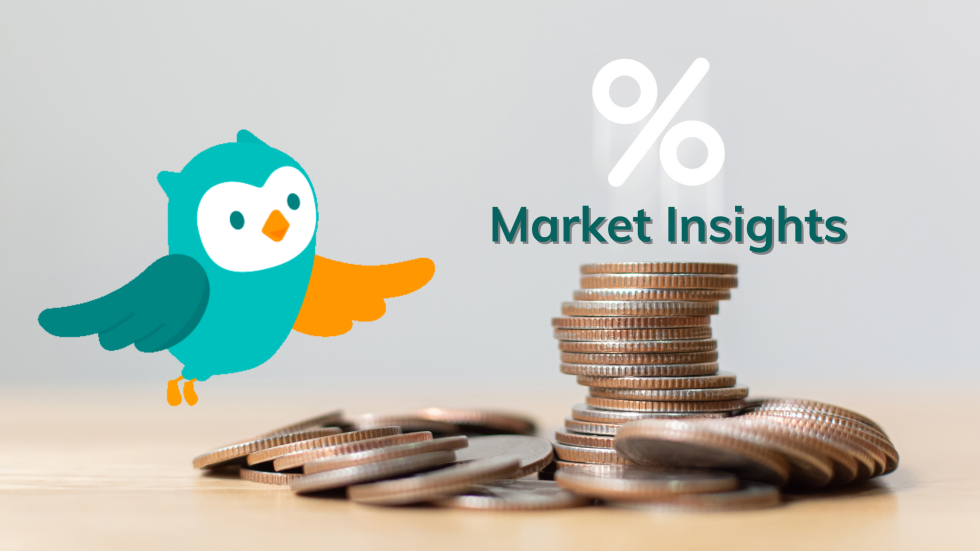Note: It was announced in November 2023 that MoneyOwl will be acquired by Temasek Trust to serve communities under a re-purposed model, and will move away from direct sale of financial products. The article is retained with original information relevant as at the date of the article only, and any mention of products or promotions is retained for reference purposes only.
______________
In this week’s market insights, our investment team shares why going in and out of the market can cause you to potentially lose out profoundly.
(18 July 2022 – 22 July 2022)
Major stock indices rebounded over the past week with the S&P 500 up 2.56%, MSCI World Index up 3.20% and MoneyOwl’s 100% Equity portfolio up 2.25%. Equities showed resilience amidst a flurry of negative news – from the release of a disappointing economic survey and central bank rate hikes to energy supply disruption.
In Fixed Income, prices of US government bonds surged on Thursday and Friday, after the release of a negative economic survey coming out of the US sent yields sharply lower for the week. The round of softer-than-expected business outlook survey reports added further worries to ongoing concerns over a global economic slowdown.
Over the past five weeks, the S&P 500 have rebounded 7.5% since it hit its low during the week of 13 June. The recent rebound reminds us that the impact of being out of the market for just a short period of time can be profound, as shown by this hypothetical investment in the stocks that make up the Russell 3000 Index, a broad US stock market benchmark.
A hypothetical $1,000 investment made in 1997 turns into $10,367 for the 25-year period ending December 31, 2021. Over that same period, if you miss the Russell 3000’s best week, which ended November 28, 2008, the value shrinks to $8,652. Miss the three best months, which ended June 22, 2020, and the total return dwindles to $7,308.

There’s no proven way to time the market – targeting the best days or moving to the sidelines to avoid the worst – so the evidence suggests staying put through good times and bad. Missing only a brief period of strong returns can drastically impact overall performance.
At MoneyOwl, we do not have a crystal ball telling us when markets will rise or fall, but what we know is that the human population eventually triumphs against all kinds of crisis, from market downturns to war. There is a possibility that markets could fall further and the recent rebound by no means indicates that a recovery is coming, especially with many macro issues remaining unresolved. However, the time-tested philosophy of staying invested helps ensure that you’re in a position to capture what the market has to offer. It is the nature of the markets to see your portfolio value go down in the short term and rise over the long term.
In other market news this week…
Energy Supply Disruption
In Europe, the energy problems are mounting: record temperatures are expected in the UK while low river levels and reduced nuclear capacity in France and Germany means alternatives to Russian gas are becoming scarce. Natural gas prices in the region rose this week as concerns remain high over the restoration of supplies from Gazprom PJSC. The company declared force majeure on several shipments to buyers last month, and the news invoked some volatility in equities after fear of more supply chain disruption of energy will cause prices to rise further, exacerbating inflation.
Tech Rout
Several tech companies are slowing hiring due to an uncertain future outlook. These companies include behemoths like Apple, which stated that they are slowing hiring and spending for some teams in 2023, and also won’t backfill roles or add new staff in certain cases. Google also says it will pause hiring for two weeks, according to an internal email cited by employees.
During the week, Snap Inc. fell to its lowest level in more than two years after the company reported disappointing sales, roiled by a major slowdown in ad spending and rising competition for dwindling Marketing dollars. Shares of Meta Platforms Inc. and Alphabet Inc. fell in tandem.
Rare Discussion
US President Joe Biden says he expects to speak to Chinese leader Xi Jinping “within the next 10 days.” The two spoke back in March. Biden has been expected to announce his decision on whether to scrap some of former US President Donald Trump’s tariffs. Separately, China’s envoy to the US has said that the Biden administration is undermining the “One China” policy through its support of Taiwan, and is exacerbating tensions with its human rights claims over Beijing’s treatment of Hong Kong and Xinjiang.
Political and Financial Turmoil in Europe
Mario Draghi resigned as Italy’s prime minister, a move that raises the prospect of quicker elections as soon as early October. Investors reacted by driving domestic bond yields sharply higher, while stocks fell. On Thursday, the European Central Bank (ECB) reckoned it can defy a history of aborted interest-rate hikes as it raised borrowing costs even as it confronts the risk of recession and Italian political turmoil. The central bank hiked rates by 50 basis points on Thursday, warning that inflation is spreading, worsened by a weakening euro. This is the third time in the near quarter-century of the ECB’s history that it’s raised rates with a crisis of some sort blazing in the background.
Covid Resurgence and Pox Insurgence
US President Joe Biden tested positive for Covid-19 on Thursday. Biden, 79, is experiencing mild symptoms and has begun taking Pfizer Inc.’s Paxlovid treatment for the disease. Adding on to Covid, the global outbreak of monkeypox is getting worse, and more worrisome. Researchers said that more than 15,000 people have been infected with the disease, and are suffering from symptoms not normally linked to the virus, leading to missed and mistaken diagnoses. Japan has recently issued a global level 1 travel warning over monkeypox.
Read more Market Insights here.
Disclaimer: While every reasonable care is taken to ensure the accuracy of information provided, no responsibility can be accepted for any loss or inconvenience caused by any error or omission. The information and opinions expressed herein are made in good faith and are based on sources believed to be reliable but no representation or warranty, express or implied, is made as to their accuracy, completeness or correctness. Expressions of opinions or estimates should neither be relied upon nor used in any way as an indication of the future performance of any financial products, as prices of assets and currencies may go down as well as up and past performance should not be taken as an indication of future performance. The author and publisher shall have no liability for any loss or expense whatsoever relating to investment decisions made by the reader.





